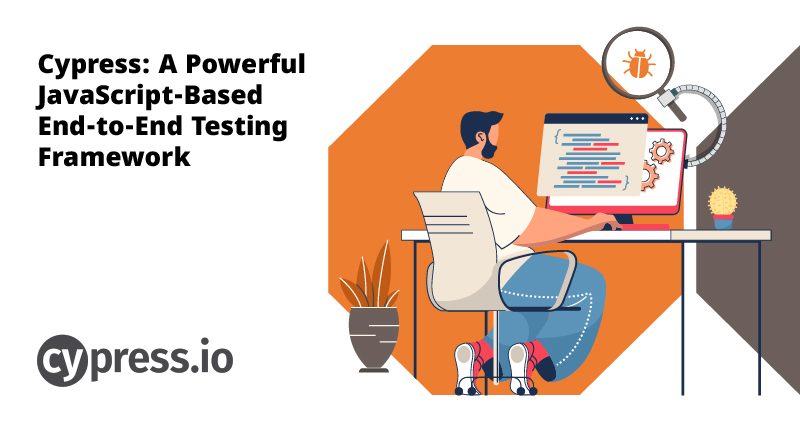

Cypress is an open-source end-to-end testing framework designed for modern web applications. It is built on top of Mocha, a popular JavaScript testing framework, and provides a comprehensive set of tools and features to streamline the testing of web applications.

Cypress is specifically designed for testing modern web applications, making it a popular choice among developers and testers. It simplifies automated testing with a user-friendly interface and the use of JavaScript for test scripting. Cypress is known for its capabilities and intelligence, which help ensure the functionality and reliability of web applications.
Cypress simplifies the process of creating and executing tests. You write test scripts in JavaScript, which is a widely used language among developers. The Cypress interface is highly intuitive and developer-friendly, making it easier for individuals with varying levels of experience to work with the framework.
One of the standout features of Cypress is its ability to capture screenshots and videos during test case execution. This feature aids in debugging by allowing testers and developers to visually inspect what happened during a test, helping identify and resolve issues more effectively.
Cypress, by default, waits for elements to become visible, which eliminates the need for explicit wait statements in your test code. This automatic waiting feature simplifies the test-writing process and makes your tests more reliable, as it ensures that the application is in the expected state before proceeding with test actions.
When setting up a Cypress project, it generates a specific directory structure with various folders and files, each serving a unique purpose. Key components are explained below:
This is the core folder of your Cypress project. It contains sub-folders such as:
The node modules folder contains all the dependencies required by your Cypress project. These packages are managed through Node.js’s package manager, npm. They include libraries and tools that Cypress needs to function correctly.
The cypress.config.js file is where you can configure various settings for Cypress, such as browser options, base URLs, and other testing-related parameters. You can customize this file to suit your project’s specific requirements.
This file is generated automatically when you install Cypress, and it locks down the specific versions of the dependencies your project uses. It ensures consistency in the dependencies across different environments and ensures that everyone working on the project uses the same versions.
The package.json file contains metadata about your project, such as its name, version, description, and author. It also lists the dependencies needed for your project to function. It’s a fundamental part of Node.js projects and helps manage and install the necessary libraries and tools for your project.
Cypress is primarily written in JavaScript, allowing you to write automated tests for software products. This framework is specially crafted for modern web applications and specializes in testing applications.
It is a completely independent tool that doesn’t rely on other tools to create tests. Furthermore, Cypress uses JavaScript to create tests, and it doesn’t require you to be proficient in JavaScript or coding; just the basics are enough to get started with Cypress testing.
Selenium is an automated end-to-end testing tool that enables you to write tests in any of the major programming languages. The framework also allows you to test the web application on multiple browsers, such as Chrome, Firefox, Safari, and Internet Explorer, ensuring that the application is free of bugs for production.
Also Read: Top 11 Selenium Alternatives
Also Read: Cypress vs Selenium
The choice between Cypress and Selenium depends on your specific testing requirements and your familiarity with JavaScript.
Cypress is an excellent choice for front-end web application testing, especially if you’re looking for a straightforward, user-friendly experience. Selenium is more versatile, capable of testing a wide range of web and mobile applications, and is suitable for those who prefer to work with different programming languages.
SPEC INDIA is your trusted partner for AI-driven software solutions, with proven expertise in digital transformation and innovative technology services. We deliver secure, reliable, and high-quality IT solutions to clients worldwide. As an ISO/IEC 27001:2022 certified company, we follow the highest standards for data security and quality. Our team applies proven project management methods, flexible engagement models, and modern infrastructure to deliver outstanding results. With skilled professionals and years of experience, we turn ideas into impactful solutions that drive business growth.
SPEC House, Parth Complex, Near Swastik Cross Roads, Navarangpura, Ahmedabad 380009, INDIA.
This website uses cookies to ensure you get the best experience on our website. Read Spec India’s Privacy Policy